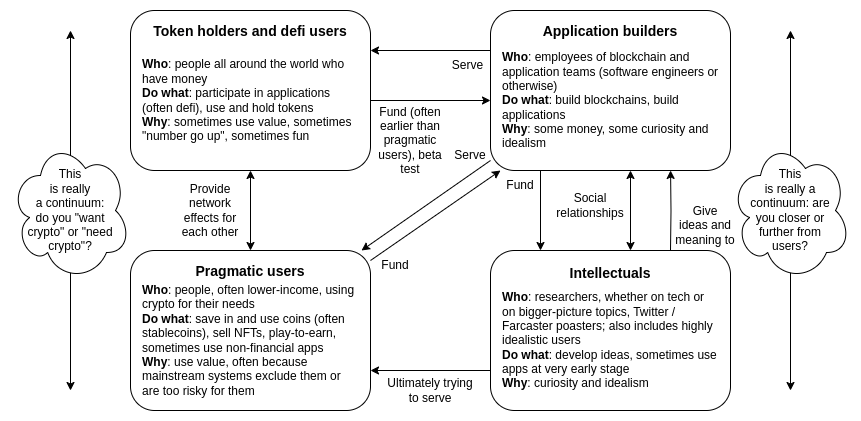
Degen: short for “degenerate”, used to refer to a trader who frequently engages in highly speculative and risky investments.
Communism: an economic philosophy where the common good is the prime objective; a word that scares Americans (U.S).
Vitalik Buterin is no longer a boy. The Russian-born Canadian college dropout who, at twenty years old, co-founded the first blockchain with smart contracts support made the announcement in a blog post entitled “The end of my childhood”, published in January.
In an essay touching on both his personal journey and the broader state of the crypto-industry, Buterin has become more introspective. “I actually have responsibilities in this world, and I need to be intentional about how I operate.”
This epiphany was followed by a series of blog posts where, juggling between idealism and realism, the Ethereum co-founder sets forth his vision for the future of Web3.

Before announcing his crypto-adulthood, some of the thoughts expressed in recent blog posts such as My techno-optimism, Make Ethereum Cypherpunk Again, and The promise and challenges of crypto + AI applications, already sparked debate amongst crypto users.
Yet it is the blogs published during the past week, What else could memecoins be? and Degen communism: the only correct political ideology, that are proving tricky to for the community to navigate.
Unlike in 2014, the crypto space is no longer filled with anti-system idealists and techno-anarchist innovators. Their influence in Web3 has been outshined by hordes of degen traders mindlessly digging for personal wealth and financial U.S. companies leveraging technology to drive their profits forward.
Like many of his peers from Ethereum’s early days, Buterin sees the path to Web3 as degenerative. Yet, unlike some of them who have preferred to throw in the towel on crypto than get into bed with the latest generation of users, the software developer is ready to embrace them.
Degen Communism
“This brings me to the core idea of degen communism: a political ideology that openly embraces chaos, but tweaks key rules and incentives to create a background pressure where the consequences of chaos are aligned with the common good.”
Advocating for any type of communism in a space increasingly occupied by U.S. citizens is a dangerous endeavor. There is generational trauma to the word, which carries memories of a hyper-alert time when kids hid beneath school tables practicing for the doomsday when “communists” would mercilessly drop the A-bomb.
Buterin is often too honest, both when recounting his personal experiences or presenting his theories, and the word “communism”, dangerous or not, is the best fit for his vision. To him, the crypto space becomes a place where those who spend money chaotically, the “degens”, end up serving the needs of the low-income “pragmatic users” who interact with blockchain to satisfy existential needs (e.g. access to banking).
“If you have to be financially brutal on someone, be brutal on those who can handle it.”
“Degen communism” is the alignment of the needs between those looking for entertainment through investing in memecoins and other degen products, and those seeking cryptocurrencies to make up for the shortcomings of their local governments and public infrastructure. It's a way to make the chaos of social media interactions, and the ups and downs of the markets work towards emancipating the ones at the bottom of international capitalism.
“The answer is, it wants chaos. It does not want gentle debates between professionals who “disagree on policy but agree on civics”. It wants decisive action and risk, in all its glory.”
Buterin already has a practical example of how to implement his new philosophy: Memecoins, which the software developer recognizes to have nothing new and particularly interesting going for them in this latest bull market, can, however, have their tokenomics “tweaked” to “create something more positive-sum and long-lasting.”
“I value people’s desire to have fun, and I would rather the crypto space somehow swim with this current rather than against it. And so I want to see higher quality fun projects that contribute positively to the ecosystem and the world around them,” the Ethereum co-founder wrote.
Will the crypto-space follow the visionary’s lead or continue in its current trajectory?

